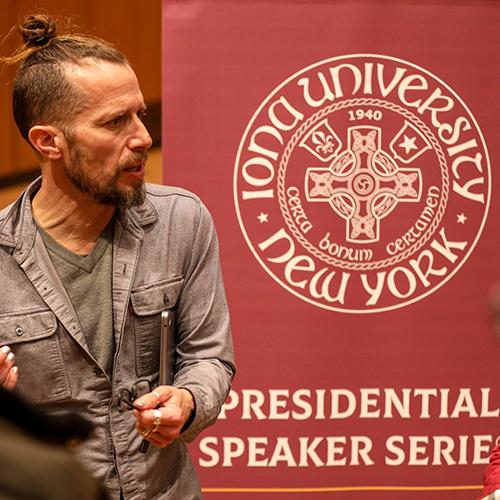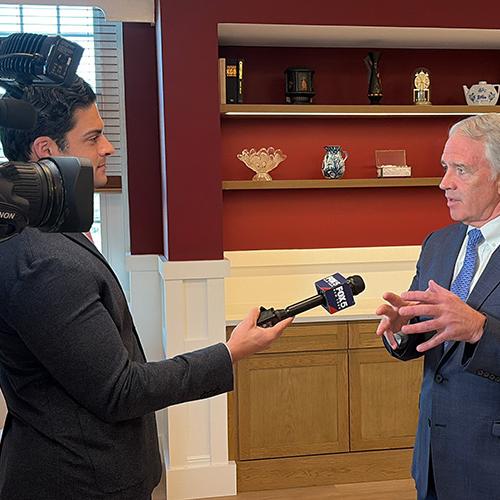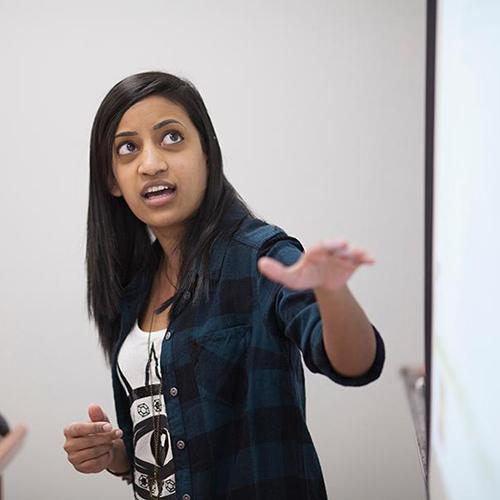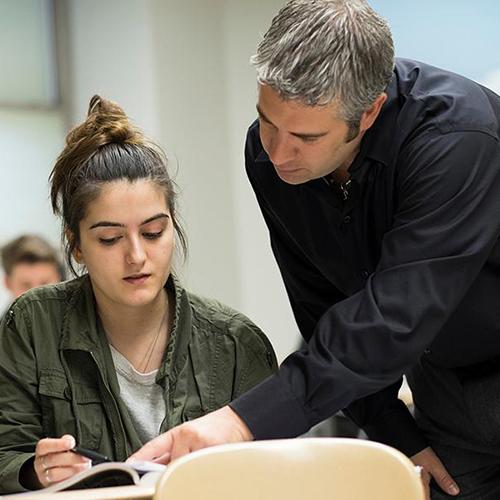How to Become A Math Teacher
Why Become a Math Teacher?
Does working with functions, rational numbers and the Pythagorean theorem while teaching young, inquisitive minds sound compelling? Then becoming a math teacher may be a rewarding professional pathway for you.
As a math teacher, you can help students gain crucial life skills and empower them to become problem solvers and critical thinkers. Through your instruction and dedication, students can progress in their ability to solve equations, reason quantitatively, and take abstract concepts and use them in practical application.
By becoming a math teacher, you take on an essential role in preparing students for higher-level learning, developing their critical thinking and reasoning skills and equipping them to navigate life outside the classroom.
What Does a Math Teacher Do?
Math teachers’ primary responsibility is to teach students how to go about solving problems, how to reason quantitatively and abstractly and how to model mathematics. But, for many students, math can be an intimidating and challenging subject. Math teachers must take abstract concepts and processes and communicate them to students in an engaging and effective way.
Elementary math teachers cover the fundamentals of mathematics. Starting in kindergarten, they teach students how to count, identify shapes and make sense of quantities. In later grades, they guide students through learning addition, subtraction, multiplication and division, understanding fractions and decimals, and representing and interpreting data.
In middle school, math teachers equip students with the skills to tackle more complex expressions and equations, make sense of proportional relationships and use functions. There is also a strong emphasis on using mathematical principles and real-world problem solving to help students develop their relational and quantitative understanding.
As students progress into high school math, teachers focus on preparing them for college and future careers. Math teachers help students with their continually evolving understanding of numbers, including the real and complex number system and modeling. They also guide students as they work on more advanced material such as algebra, geometry, statistics and probability, trigonometry and calculus.
In all grades, math teachers ensure students can model their learning and reason abstractly and quantitatively at an age-appropriate level.
Additionally, math teachers are responsible for maintaining a safe and functional learning environment, creating lesson plans and curricula per state standards, assessing students’ progress and providing additional help when needed, meeting with parents and undergoing routine professional development. Math teachers may also be required to help with extracurricular activities or supervise students outside classroom time.
Math Teacher Requirements
Earn a Bachelor’s Degree
At a minimum, math teachers must hold a bachelor’s degree. However, there is flexibility in the type of undergraduate degree they can pursue.
Prospective teachers who want to teach elementary mathematics should find and enroll in a college or university that offers an undergraduate degree in elementary education. This type of program will provide teachers in training with the necessary pedagogical skills, opportunities for student teaching experiences and a quick path to certification.
For those who want to pursue a teaching career in secondary education, teaching more advanced mathematics, there are several degree paths to take. One option is to apply to a secondary education degree program. Similar to an elementary education program, this degree provides students with a direct route to a teaching career. Students learn how to teach and gain hands-on teaching experience in a classroom and progress to their certification exam. These programs offer specializations to ensure students will excel in their subject-specific exams and fields.
If you want to become a middle or high school teacher but wish to pursue a bachelor’s degree in mathematics, you are able to earn your teaching credentials. Graduates with a bachelor’s degree in mathematics can enroll in an educator preparation program that provides the required teacher training courses and student teaching practicum required for certification
Learn More: Education (BA, BS)
Math Teacher Certification Process
To become a math teacher, the base requirements often are to:
- hold a bachelor’s degree or higher;
- complete a student teaching experience;
- complete a state-registered preparation program;
- pass both a subject-specific examination and a state certification examination;
- pass a background check.
Depending on the state you want to work in, what grade level and subject area you want to teach and your experience, the steps you need to take for certification will vary.
To learn more about what your state requires to earn a valid teaching certification, visit the U.S. Department of Education’s state contacts directory to find important contact information for your state’s department of education.
To learn more about what your state requires to earn a valid teaching certification, visit the U.S. Department of Education’s state contacts directory to find important contact information for your state’s department of education.
What are the Career Prospects for Math Teachers?
Because mathematics is an integral part of every grade-level curriculum, and due to turnover in the educator workforce because of teachers retiring or switching professions, math teachers are in steady demand.
According to the U.S. Bureau of Labor Statistics, middle and high school teacher openings are expected to grow by four and five percent each year over the next decade, which tracks along with the national average. It’s projected that approximately 47,300 middle school teaching positions will open annually. For high school teachers, it’s anticipated that 77,900 positions will open.
While math teacher salaries will vary based on state, experience level, school district, whether the school is public or private and a variety of other factors, it is helpful to look to national standards to gauge earning potential. For middle school teachers, the median salary is $61,320. The median salary for high school teachers was comparable at $61,820.
What Skills Should Math Teachers Have?
While having a broad understanding of mathematics and best teaching practices is vital to working as a math teacher and for the benefit of students, it is equally important to have strong communication skills. They must be able to present complex, abstract concepts in various ways to make sure students understand the lesson and can apply the principles in practice.
Mathematics can be a challenging subject for many students. If students lack a solid understanding of mathematical fundamentals, it can be difficult to progress. Maintaining an attitude of empathy and patience is also critical when working with students who may be struggling. Upholding a safe and supportive classroom environment ensures students can trust you as their teacher and feel confident asking questions and seeking help when needed. This mutual respect and understanding will benefit students’ educational success.
Earning a Master’s Degree
Although some states require a master’s degree to teach secondary grade levels, a bachelor’s degree and up-to-date certification are the base requirements. There are, however, certain career benefits to earning a master’s degree. Pursuing graduate education opens up opportunities for higher-level administrative positions, higher compensation or more teaching opportunities.
Master of Science in Teaching at Iona University
Iona University offers a Master of Science in Teaching (MST) designed to give career changers the necessary training in teacher education and set them up for success in the classroom. Depending on their preferred grade level and subject area, the program offers four tracks to prepare students for their unique teaching careers.
The graduate program offers a wide range of courses to provide a thorough overview of pedagogical practices and classroom management skills. It also requires graduate students to spend one semester observing and teaching in various secondary school classrooms.
Created following the New York State Education Department’s certification regulations, Iona’s graduate teaching program equips students to excel in their coursework and field placements. Students are also well-prepared to sit for the New York State Teacher's Certification Examinations (NYSTCE).
The MST degree program provides students with the training they need to become innovative teachers who nurture and inspire young students and excel in their careers.
Make Your Next Move to Become a Math Teacher
Math teachers specialize in supporting students as they learn to quantify the world around them. Their role is to teach students critical math skills to help them navigate higher education and life outside the classroom.
Iona’s Master of Science in Teaching degree provides students with the necessary pedagogical training and hands-on student teaching experience they need to succeed in the classroom and inspire budding mathematicians.






